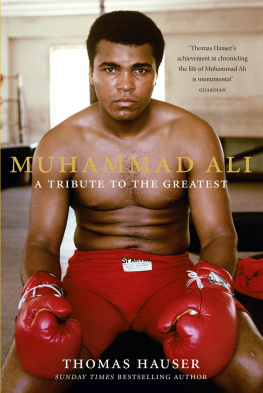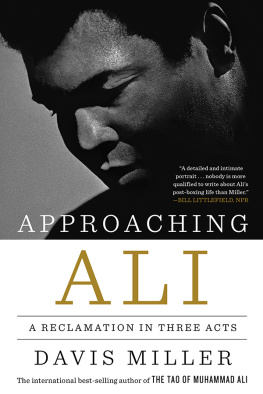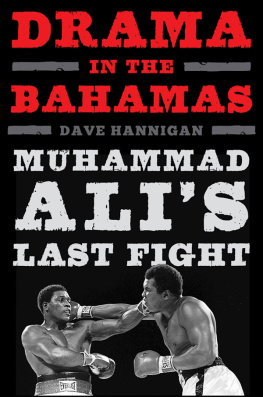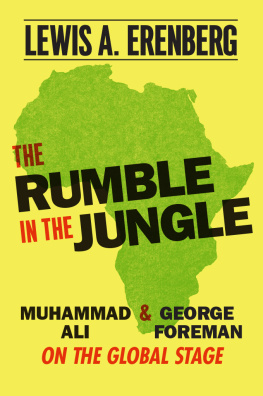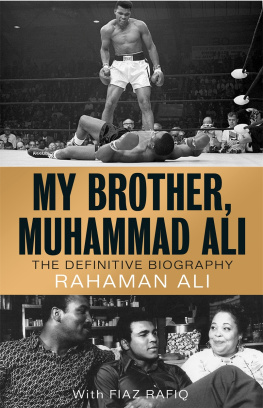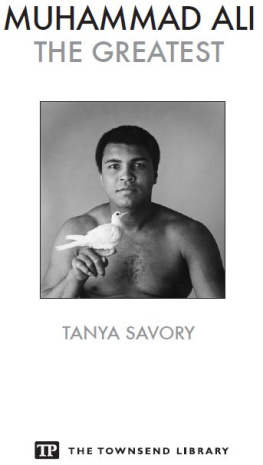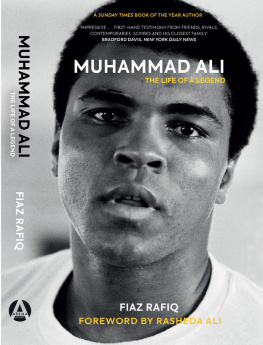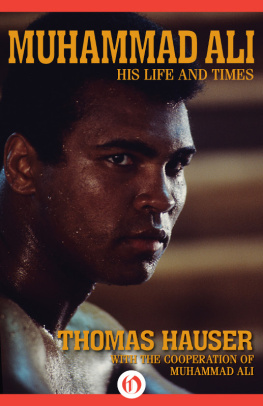Muhammad Ali belongs to the world.
and to everyone who is part of his story.
(1996)
Cassius Marcellus Clay Jr, as Muhammad Ali was once known, was born in Louisville, Kentucky, on 17 January 1942. Louisville was a city with segregated public facilities; noted for the Kentucky Derby, mint juleps, and other reminders of southern aristocracy. Blacks were the servant class in Louisville. They raked manure in the backstretch at Churchill Downs and cleaned other peoples homes. Growing up in Louisville, the best on the socio-economic ladder that most black people could realistically hope for was to become a clergyman or a teacher at an all-black school. In a society where it was often felt that might makes right, white was synonymous with both.
Alis father, Cassius Marcellus Clay Sr, supported a wife and two sons by painting billboards and signs. Alis mother, Odessa Grady Clay, worked on occasion as a household domestic. I remember one time when Cassius was small, Mrs Clay later recalled. We were downtown at a five-and-ten-cents store. He wanted a drink of water, and they wouldnt give him one because of his colour. And that really affected him. He didnt like that at all, being a child and thirsty. He started crying, and I said, Come on; Ill take you someplace and get you some water. But it really hurt him.
When Cassius Clay was 12 years old, his bike was stolen. That led him to take up boxing under the tutelage of a Louisville policeman named Joe Martin. Clay advanced through the amateur ranks, won a gold medal at the 1960 Olympics in Rome, and turned pro under the guidance of The Louisville Sponsoring Group, a syndicate comprised of 11 wealthy white men.
Cassius was something in those days, his long-time physician, Ferdie Pacheco, remembers. He began training in Miami with Angelo Dundee, and Angelo put him in a den of iniquity called the Mary Elizabeth Hotel, because Angelo is one of the most innocent men in the world and it was a cheap hotel. This place was full of pimps, thieves and drug dealers. And heres Cassius, who comes from a good home, and all of a sudden hes involved with this circus of street people. At first, the hustlers thought he was just another guy to take to the cleaners; another guy to steal from; another guy to sell dope to; another guy to fix up with a girl. He had this incredible innocence about him, and usually that kind of person gets eaten alive in the ghetto. But then the hustlers all fell in love with him, like everybody does, and they started to feel protective of him. If someone tried to sell him a girl, the others would say, Leave him alone; hes not into that. If a guy came around, saying, Have a drink, it was, Shut up; hes in training. But thats the story of Alis life. Hes always been like a little kid, climbing out onto tree limbs, sawing them off behind him and coming out okay.
In the early stages of his professional career, Cassius Clay was more highly regarded for his charm and personality than for his ring skills. He told the world that he was The Greatest, but the brutal realities of boxing seemed to dictate otherwise. Then, on 25 February 1964, in one of the most stunning upsets in sports history, Clay knocked out Sonny Liston to become heavyweight champion of the world. Two days later, he shocked the world again by announcing that he had accepted the teachings of a black separatist religion known as the Nation of Islam. And on 6 March 1964, he took the name Muhammad Ali, which was given to him by his spiritual mentor, Elijah Muhammad.
For the next three years, Ali dominated boxing as thoroughly and magnificently as any fighter ever. But outside the ring, his persona was being sculpted in ways that were even more important. My first impression of Cassius Clay, author Alex Haley later recalled, was of someone with an incredibly versatile personality. You never knew quite where he was in psychic posture. He was almost like that shell game, with a pea and three shells. You know: which shell is the pea under? But he had a belief in himself and convictions far stronger than anybody dreamed he would.
As the 1960s grew more tumultuous, Ali became a lightning rod for dissent in America. His message of black pride and black resistance to white domination was on the cutting edge of the era. Not everything he preached was wise, and Ali himself now rejects some of the beliefs that he adhered to then. Indeed, one might find an allegory for his life in a remark he once made to fellow Olympian Ralph Boston. I played golf, Ali reported, and I hit the thing long, but I never knew where it was going.
Sometimes, though, Ali knew precisely where he was going. On 28 April 1967, citing his religious beliefs, he refused induction into the United States Army at the height of the war in Vietnam. Alis refusal followed a blunt statement, voiced 14 months earlier I aint got no quarrel with them Vietcong. And the American establishment responded with a vengeance, demanding, Since when did war become a matter of personal quarrels? War is duty. Your country calls you answer.
On 20 June 1967, Ali was convicted of refusing induction into the United States Armed Forces and sentenced to five years in prison. Four years later, his conviction was unanimously overturned by the United States Supreme Court. But in the interim, he was stripped of his title and precluded from fighting for three and a half years. He did not believe he would ever fight again, Alis wife at that time, Belinda Ali, said of her husbands exile from boxing. He wanted to, but he truly believed that he would never fight again.

